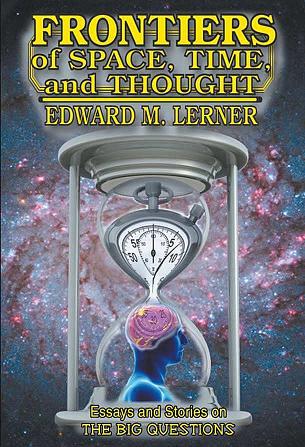 Frontiers of Space, Time, and Thought:
Frontiers of Space, Time, and Thought:
Essays and Stories on The Big Questions
by Edward M. Lerner
(FoxAcre Press, 264 pp., March 22, 2012)
Stories:
“RSVP”
“Unplanned-for Flying Object”
“Chance of Storms”
“A Time for Heroes”
“Where Credit is Due”
“Grandpa?”
“No GUTs, No Glory”
“Inside the Box”
“Small Business”
“A Matter of Perspective”
Articles/Essays:
Reviewed by Dario Ciriello
Frontiers of Space, Time, and Thought by Edward M. Lerner is a collection of short stories, articles, and essays, most of which originally appeared in the pages of Analog Science Fiction and Fact over the last five years. This is Hard SF about the Big Ideas, and overall the most enjoyable and absorbing single-author collection I’ve read in a long while. Since most of the thirteen stories are short enough that reviews would be a spoiler, I’ll just touch on a couple:
“A Time for Heroes” is the story of Travis Logan, a pro VR gamer whose daily existence seems meaningless compared to his virtual exploits. Travis longs for a transformative moment, a grand challenge, something to define his real self. When he’s hired on to train an AI in a first-person battlefield sim, Travis takes it in his stride, just another working day. Until he realizes he doesn’t know the way out of the simulation…
The longest story by far in the collection is a novelette titled “Small Business.” The Syndicate, a state-owned enterprise of the Eurasian Union, has lobbied and cheated its way to a monopoly on nanoengineering by getting the technology banned on Earth, leaving the Syndicate free to work with nanites in space. There, the Syndicate’s lead on diamond-hulled ships—a technology it refuses to share or license—guarantees its competitive edge over the independents that must rely on fuel-hungry, metal-hulled ships to hoist materials for building nanofabs into orbit. When microelectrical mechanical systems (MEMS) engineer Jason Grimaldi is recruited by an underground faction dedicated to stealing the Syndicate’s technology and breaking its monopoly, the stage is set for a tense story of industrial espionage and micromachines.
Beyond these two longer works, expect a clutch of two or three stories thematically related to each of the articles in the collection. Thus, there are stories featuring first contact, time travel, nanotech, and more.
I found Lerner’s stories satisfying and refreshing in a time when the field seems to be leaning more to the literary than the speculative—this is good, solid Hard SF full of precisely-focused speculation. The author’s prose style is direct, unaffected, all business: there’s no fat here, not a word. Each story begins precisely where it should and follows a ballistic trajectory to its conclusion. Expect stripped-down, Asimovian stories twinkling with surprising twists and artful peripateia. And although these pieces are generally too short for any serious character development, there isn’t the cold, geeky stiffness that one still sees in some Hard SF today, and which is a turnoff for many readers.
The nonfiction part of Lerner’s collection includes seven absorbing essays on language, first contact, RFIDs, FTL, nanotech, and the search for earth-crossing space rocks and NEOs (Near-Earth Objects). Each of the original pieces has been updated to the moment of publication, replete with footnotes and URLs. This is fine, lucid, nonfiction writing, fully accessible to the educated layman yet not dumbed down, and guaranteed to make you feel smarter for just having read them. The article on RFIDs—a technology I’ve been following for some while—is especially interesting, and the author is unstinting in outlining the implications that this technology has for the privacy and freedom of the individual.
If you only read one Hard SF book this year, make it this one. You won’t regret it.